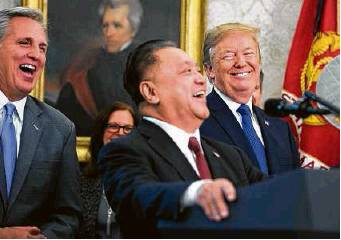Outrage flares annually over CEO pay, but little changes
CHRIS TOMLINSON Commentary
Journalists poring over annual reports are finding that CEO pay is outrageously high, fails to reflect corporate performance and drains shareholder value.
In other words, the status quo remains because boards of directors don’t seem to care.
Topping this year’s highest-paid lisxt is Hock Tran, CEO of semiconductor company Broad-com. He took home $103.7 million in 2017, which includes $98.3 million in stock awards, according to Fortune magazine.
That assumes that Broad-com’s stock remains stable through 2021. If Broadcom shares perform worse than 75 percent of S&P 500 companies, he gets nothing. If the shares outperform 90 percent of the index, he gets shares worth $179.2 million. Tan’s pay package is equal to the take-home pay of 2,039 average American workers, who earned $50,620 last year, according to the Bureau of Labor Statistics.
Note that his pay is not tied to Broadcom’s debt ratio, overall production, new patents or free cash flow. He only needs to worry about how the company’s stock price compares to other companies in the S&P 500. Share value is paramount, and he delivered a 58 percent return last year.
In many cases, though, CEO pay bears no resemblance to performance. The 10 percent of CEOs who received the highest raises last year delivered only middling results, according to the Wall Street Journal.
CEOs with below-average pay often outperformed celebrity executives. Mauricio Gutierrez, CEO of NRG, generated the second-highest return for shareholders in the S&P 500 but was paid only $9 million for turning around the struggling power company.
“Stars are often underpaid, while average performers are often overpaid,” Herman Aguinis, a professor of management at George Washington University School of Business, told the Journal.
In a study published in the journal Management Research, Aguinis and his colleagues analyzed the earnings history of 4,000 CEOs over their tenures and found no overlap between the top 1 percent in pay and the top 1 percent in corporate earnings.
Leslie Moonves, CEO at CBS television, was the second-highest paid CEO in 2017 with a $69.3 million payout, while his company’s stock dropped 6.2 percent. According to securities filings, the board awarded Moonves $12 million for renewing his contract after the company lost money.
Most disturbingly, none of this is new. CEO pay has risen 997 percent between 1987 and 2014, outpacing the 10.9 percent increase the average American has seen, according to the left-leaning Economic Policy Institute. CEO pay has risen 70 percent faster than the stock market over the same period.
Last year boards of directors awarded most CEOs annual pay raises of 9.7 percent or better, according to the Journal’s analysis. The average American received a wage hike of 2.9 percent.
Researchers can find no economic justification for CEO salaries accelerating faster than the average workers.
Higher-paid CEOs simply do not outperform lower paid CEOs. Studies routinely show no correlation between pay and performance, while companies led by younger, hungrier and lower-paid CEOs routinely outperform market indexes.
There is also no shortage of CEO candidates and little competition for them. Few companies need CEOs with unique skills, and boards tend to buy charisma rather than skills anyway. The general economy and market forces within an industrial sector are far more accurate predictors of a company’s performance, regardless of how much the CEO earns.
Part of the problem comes from executive recruitment teams, hired by boards to find new CEOs. Recruiters examine comparable salaries and recommend that the board outbid the average, and then the top candidate always demands more. And since many board members are CEOs or prospective CEOs themselves, they are more than happy to run up executive salaries
The old tax code also made it easier to pay more because corporations could deduct an executive’s performance pay. But not under the new tax code, which removes the deduction as part of balancing out the lowering of the corporate tax rate.
This change has companies dropping performance pay and moving back to paying abasic salary instead of bonuses in 2018 and beyond. The question for corporate boards, and shareholders, is whether they will still consider a $103.7 million annual salary fair and just compensation if it’s not tied to performance.
I bet that as long as corporate boards are made up of the CEOs’ cronies, who have every incentive to see executive compensation rise, they will find ways to justify obscene salaries for their peers.
Sadly, for all of the talk about protecting shareholder value, the foxes are in charge of the henhouse, and they are shamelessly feasting, no matter how much the public complains.
Chris Tomlinson is the Chronicle’s business columnist.chris.tomlinson@chron.com twitter.com/cltomlinson

